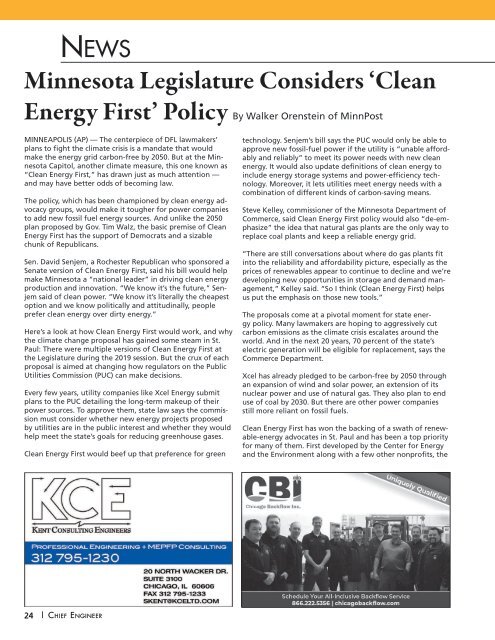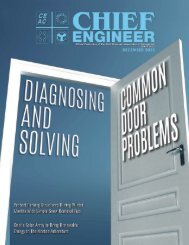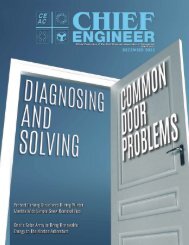Create successful ePaper yourself
Turn your PDF publications into a flip-book with our unique Google optimized e-Paper software.
NEWS<br />
Minnesota Legislature Considers ‘Clean<br />
Energy First’ Policy By Walker Orenstein of MinnPost<br />
MINNEAPOLIS (AP) — The centerpiece of DFL lawmakers’<br />
plans to fight the climate crisis is a mandate that would<br />
make the energy grid carbon-free by 2050. But at the Minnesota<br />
Capitol, another climate measure, this one known as<br />
“Clean Energy First,” has drawn just as much attention —<br />
and may have better odds of becoming law.<br />
The policy, which has been championed by clean energy advocacy<br />
groups, would make it tougher for power companies<br />
to add new fossil fuel energy sources. And unlike the 2050<br />
plan proposed by Gov. Tim Walz, the basic premise of Clean<br />
Energy First has the support of Democrats and a sizable<br />
chunk of Republicans.<br />
Sen. David Senjem, a Rochester Republican who sponsored a<br />
Senate version of Clean Energy First, said his bill would help<br />
make Minnesota a “national leader” in driving clean energy<br />
production and innovation. “We know it’s the future,” Senjem<br />
said of clean power. “We know it’s literally the cheapest<br />
option and we know politically and attitudinally, people<br />
prefer clean energy over dirty energy.”<br />
Here’s a look at how Clean Energy First would work, and why<br />
the climate change proposal has gained some steam in St.<br />
Paul: There were multiple versions of Clean Energy First at<br />
the Legislature during the <strong>2019</strong> session. But the crux of each<br />
proposal is aimed at changing how regulators on the Public<br />
Utilities Commission (PUC) can make decisions.<br />
Every few years, utility companies like Xcel Energy submit<br />
plans to the PUC detailing the long-term makeup of their<br />
power sources. To approve them, state law says the commission<br />
must consider whether new energy projects proposed<br />
by utilities are in the public interest and whether they would<br />
help meet the state’s goals for reducing greenhouse gases.<br />
Clean Energy First would beef up that preference for green<br />
technology. Senjem’s bill says the PUC would only be able to<br />
approve new fossil-fuel power if the utility is “unable affordably<br />
and reliably” to meet its power needs with new clean<br />
energy. It would also update definitions of clean energy to<br />
include energy storage systems and power-efficiency technology.<br />
Moreover, it lets utilities meet energy needs with a<br />
combination of different kinds of carbon-saving means.<br />
Steve Kelley, commissioner of the Minnesota Department of<br />
Commerce, said Clean Energy First policy would also “de-emphasize”<br />
the idea that natural gas plants are the only way to<br />
replace coal plants and keep a reliable energy grid.<br />
“There are still conversations about where do gas plants fit<br />
into the reliability and affordability picture, especially as the<br />
prices of renewables appear to continue to decline and we’re<br />
developing new opportunities in storage and demand management,”<br />
Kelley said. “So I think (Clean Energy First) helps<br />
us put the emphasis on those new tools.”<br />
The proposals come at a pivotal moment for state energy<br />
policy. Many lawmakers are hoping to aggressively cut<br />
carbon emissions as the climate crisis escalates around the<br />
world. And in the next 20 years, 70 percent of the state’s<br />
electric generation will be eligible for replacement, says the<br />
Commerce Department.<br />
Xcel has already pledged to be carbon-free by 2050 through<br />
an expansion of wind and solar power, an extension of its<br />
nuclear power and use of natural gas. They also plan to end<br />
use of coal by 2030. But there are other power companies<br />
still more reliant on fossil fuels.<br />
Clean Energy First has won the backing of a swath of renewable-energy<br />
advocates in St. Paul and has been a top priority<br />
for many of them. First developed by the Center for Energy<br />
and the Environment along with a few other nonprofits, the<br />
24<br />
| Chief Engineer


















